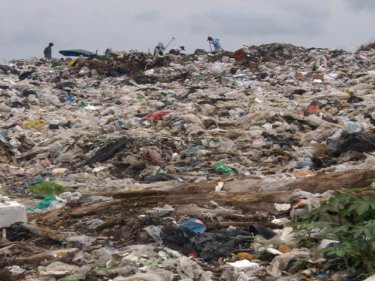Photo Album Above
PHUKET people should be alarmed at the island's waste disposal crisis. That's the conclusion after a Phuketwan team climbed Phuket's garbage ''mountain'' at the weekend.
The so-called ''mountain'' is actually more of a plateau, a huge and steadily rising block of stinking toxic trash.
What's alarming is the incredible rate of growth of Phuket's putrid pile between now and our previous visit, in February last year.
Over the intervening 15 months, the level of the plateau in Phuket City has risen at least three metres, a shameful rate that should trigger serious concern about responsibility and potential hazards.
The plateau, over an area the size of a large city block, is a frightening sight. At several points now, waste threatens to spill into surrounding pools.
Mangroves that run along the coast on one side are already showing signs of contamination. The danger of serious environmental problems should trigger immediate action, especially with the island so ill-prepared for the consequences.
Phuket is unable to dispose of its own daily waste, with dump trucks now being forced to spread their loads over a much wider area.
On the putrid plateau, scavenging birds crowd the air, packs of restless dogs roam the trash, flies swarm over everything, and a group of about 200 hardy souls pick a living from the waste.
Children play there, too.
With the island's single overloaded disposal incinerator in the background, (and with its own toxic air issues) the harsh panorama at Saphan Hin in Phuket City makes for an apocalyptic vision.
Having suffered the consequences of a tsunami, an air tragedy, a diving disaster, airport blockades, a jellyfish invasion or two, health scares, a global financial downturn and constant political unrest, the last thing the island needs is an environmental catastrophe.
It's preventable but only, we suggest, with a dramatic change in thinking.
What bothers us most is that after the warnings 15 months ago from the head of the Phuket Natural Resources and Environment Department, Ongart Chanachanmongkol, nothing appears to have changed.
Except, that is, for the height of the putrid plateau.
At the time, Khun Ongart pointed out that a cohesive policy among Phuket's many local administrations is required, along with an active recycling campaign.
While much of the rest of the world is educating and enforcing the need for individual environmental responsibility, on Phuket, the plastic bag mentality still rules.
If local authorities and perhaps resort managements got together, the issue of waste management and control would not be as daunting as it currently seems.
Last week, 300 officials gathered to hear about the obvious but expensive solution: a second incinerator.
While the present incinerator is reasonably remote, the site for the second proposed incinerator is on the city side of the Saphan Hin canal, close to a sports stadium and not far from the IT centre, a public swimming pool and other sports facilities.
It may well be that the second incinerator will prove a more efficient and safer performer than the first. It will need to be.
With Phuket now creating 540 tonnes of waste a day, the emphasis should probably be as much on decreasing waste and recycling as on disposal.
But the island's shopping malls and supermarkets remain a sea of plastic. So does Phuket's putrid pile, where about 200 workers sift through the rubbish, and occasionally find a gold necklet or a diamond ring.
Much of it, though, is hard work, scraping at each freshly dumped pile to extract cans and plastic bottles that provide a steady if limited source of income.
We spoke to one man who has been working on Phuket's putrid pile for 21 years now, and has raised four happy, healthy, and well-educated daughters.
He says the first incinerator proved a boon in helping to dispose of Phuket's waste. But now, the waste is catching up.
The second incinerator is capable of dealing with 600 tonnes of trash a day, last week's meeting was told, and it could be working within 300 days of construction starting, at a budget of one billion baht.
For now, an environmental study is needed, along with feedback surveys from Phuket people, before the project goes ahead.
We'd recommend a visit to Phuket's putrid pile for anyone looking for a sign as to the next potential hazard in the island's future.
It's easy to find. All you have to do is follow your rubbish.
Phuket, Holiday Heaven With a Plastic Heart
Latest It's not easy being green. Laid back Phuket is apparently difficult to inspire when it comes to giving up plastic bags, according to the new governor.
Phuket, Holiday Heaven With a Plastic Heart
Trends: A Tsunami of Trash is Heading This Way
Optimistic reports on tourism and property seldom tell the whole story. Right now, garbage is Phuket's most pressing problem. Where will the junk you create today end up?
Trends: A Tsunami of Trash is Heading This Way
Enviro Chief Calls for Unity in Trash Crisis
Each day, Phuket creates twice as much garbage as it can dispose of. Yet no sensible joint approach is being taken to cope or prevent a crisis, says a leading island official.
Enviro Chief Calls for Unity in Trash Crisis










A few years ago, I remember reading story after story about the problems of the incinerator, and refuse generally in Phuket. And then pouf! Nothing!! It was like they realised it was a problem that would grow increasingly embarrassing when no solution could be found and they quietly dropped it. Or maybe they also came under pressure too from people to not report such stories. Anyway, it was kind of weird. Well Done Phuket Wan for keeping the story alive.
Posted by Simon Krupps on April 27, 2009 12:27